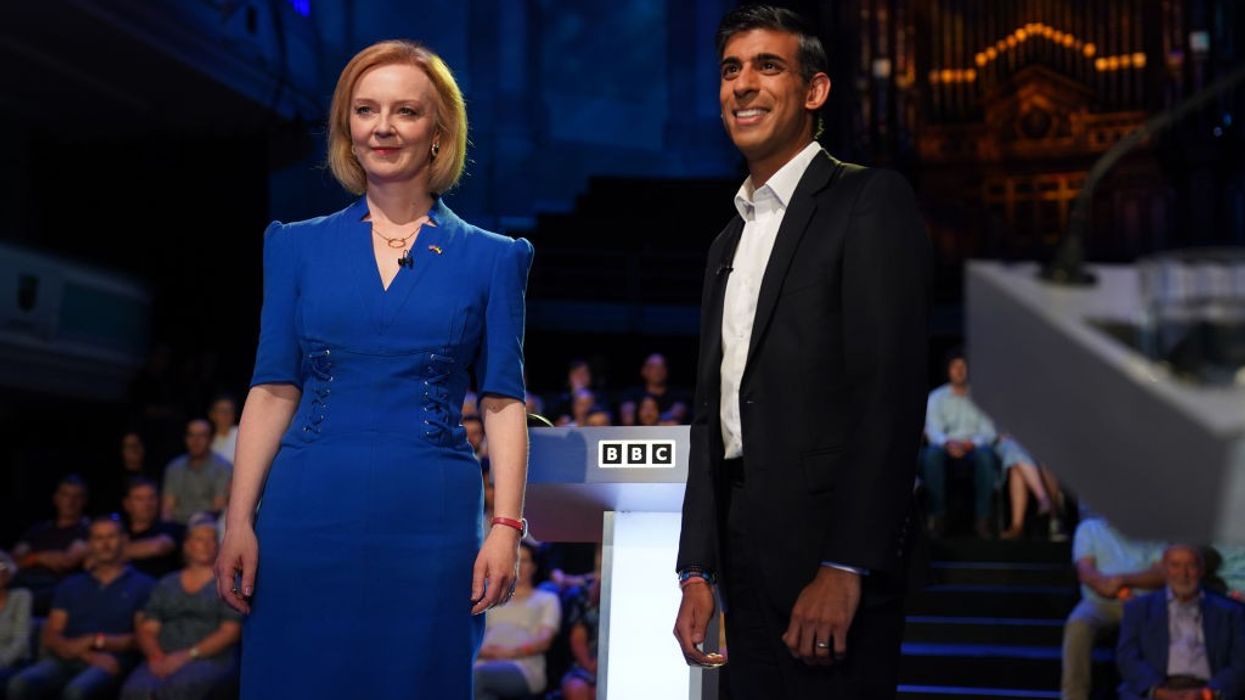Britain's two prime ministerial contenders clashed fiercely over tax, China and character on Monday night in their first head-to-head televised debate, as Rishi Sunak seeks to peg back the frontrunner Liz Truss.
The primetime debate kicked off a crucial 12-day period featuring three such live TV duels and four husting events in front of Conservative party members who will decide the contest and begin receiving their postal votes next week.
The weeks-old Tory leadership contest to replace outgoing prime minister Boris Johnson has turned increasingly bitter, with both camps fiercely briefing against each other.
Monday's BBC debate showcased that acrimony, with former finance minister Sunak savaging Foreign Secretary Truss' plans to slash taxes immediately -- a key dividing line between the pair.
"I don't think that's right, I don't think it's responsible and it's certainly not Conservative," he interjected as she detailed her proposals.
"If we follow Rishi's plans, we are headed for a recession," Truss replied, accusing him of raising taxes "to the highest rate for 70 years".
"I would act immediately -- I understand that people... are struggling," Truss added.
The leadership contest comes as Britain grapples with a cost-of-living crisis that has seen inflation surge to a 40-year high.
Sunak has vowed to curb this before cutting taxes, and called Truss' plans "a short-term sugar rush".
Grassroots focus
Opinion polls put Truss well ahead among the Tories' roughly 200,000 members, after she and Sunak emerged as the run-off candidates in a series of votes by Tory MPs.
The winner will be announced on September 5.
Sunak's resignation as finance minister earlier this month over Johnson's scandal-hit leadership helped spark the downfall of the outgoing premier.
That has angered some of the party grassroots.
Meanwhile questions about his family's tax affairs and his prior decision to retain US residency have also dented his popularity.
Truss initially struggled to gain momentum, but eventually made the run-off by winning over the party's right-wing MPs with vows to cut tax and deregulate.
A snap poll showed Conservative voters thought Truss edged Monday's debate, by 47 to 38 percent.
China
Over the weekend, Sunak announced plans to crack down on China's influence, calling it the "number-one threat" to domestic and global security.
That followed Truss accusing him of being soft on UK adversaries when he was finance minister.
"I'm delighted that you've come around to my way of thinking," she told Sunak as the issue featured at the debate.
Truss insisted his "tougher stance" had been driven by her Foreign Office tenure, but that as recently as a month ago Sunak was "pushing for closer trade relationships with China".
Sunak said she herself had been "on a journey" after previously wanting close ties with Beijing.
The pair's face-off was held in Stoke-on-Trent, in front of an audience of people who all voted Conservative at the last general election in 2019.
'Conviction'
The area, which backed Brexit heavily in the 2016 referendum, was once a traditional seat of the main Labour opposition. But it switched to the Tories -- along with dozens of its other heartland seats -- in 2019.
Both prime ministerial candidates committed to continuing Johnson's flagship "levelling up" policy of reducing decades-old ingrained regional inequalities which helped earned him that historic victory.
"It's not just a slogan for me, it's about the life I've had," said Truss, citing growing up in the Scottish town of Paisley and the northern English city Leeds.
However, she supported remaining in the EU in 2016, a decision Truss says she now regrets. She reiterated pledges to "realise post-Brexit opportunities".
Sunak noted that he backed Brexit "out of conviction", despite being warned it would ruin his political career.
"Because I believe it will be the right thing for this country," he added.
'Puerile'
Ahead of the debate, personal attacks had illustrated the growing hostility in the contest.
Culture Secretary Nadine Dorries, a Truss supporter, openly mocked millionaire Sunak over his purported expensive taste in clothing, tweeting reports he wore an expensive suit and Prada shoes on a campaign visit.
She contrasted this with Truss being more likely to wear a low price pair of earrings.
It prompted an immediate backlash from other Conservatives, with one MP saying she had "muted" Dorries on Twitter and another calling the contest "puerile" and "embarrassing".
"Time to raise the standards," Cabinet Office minister Johnny Mercer added.
In a rare sign the message could be getting through, as the debate concluded Sunak declined to advise his rival on what she could do better.
Meanwhile Truss offered the relatively mild "taking more risk and being bolder" as advice to him.
They will debate again on Tuesday evening.
(AFP)




